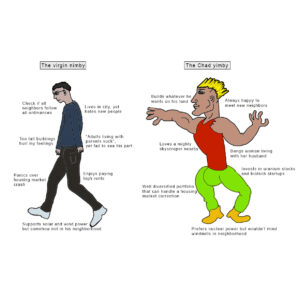Imagine this: a man buys a patch of land, pays for the materials, builds with his own hands—or hires someone willing—and then finds himself fined, threatened, or dragged into court. Why? Not because he harmed anyone. Not because he polluted, trespassed, or endangered lives. But because he didn’t ask permission. That, in the year 2025, is still a crime.
Building without a permit is one of the purest examples of a victimless crime. It is the kind of bureaucratic offense that only makes sense in a world where paperwork is sacred and personal agency is suspect.
Let’s be clear: in a truly free market, property ownership would mean what it says. You own it. If your construction doesn’t poison the groundwater, block the sun from your neighbor’s solar panels, or risk collapsing on a public sidewalk, why should a local zoning office get a veto?
The Iron Grip of Regulation
The housing market today is a rigged game. Technological advancement drives down production costs for everything from smartphones to solar panels. If you let market actors compete freely, prices go down. This is the basic engine of capitalism.
But when it comes to housing, those forces are shackled. Instead of allowing supply to rise to meet demand, local governments have built bureaucratic dam walls—zoning laws, height limits, parking mandates, permit approvals, historic overlays, and more. The result? Artificial scarcity. Fewer homes. Skyrocketing prices.
Who pays the price? Not the NIMBY retiree whose mortgage was paid off decades ago. Not the city councilor who inherited their house. It’s first-time buyers, forced into lifetime mortgages, and business owners, struggling to hire because no one can afford to live nearby. And it’s consumers, who absorb inflated rent overhead through higher prices for coffee, haircuts, daycare, and groceries.
NIMBYism: The Dictatorship of the Easily Offended
Modern cities are supposed to be beacons of diversity and innovation. But listen to the loudest local voices at a planning meeting and you’ll think the suburbs of 1957 were the golden age. A neighbor builds something “too tall” and suddenly it’s a threat to civilization. Heaven forbid someone adds a duplex to a single-family lot—there go the “neighborhood vibes.”
This is emotional zoning—legislation based not on safety, but on the hurt feelings of people who think they should get to control what others do with their property.
Let’s not pretend it’s about aesthetics, either. The same people complaining about new construction never lifted a finger when a brutalist concrete monster was built downtown in the 70s. The real objection is that new buildings might bring new people. And some urban dwellers have the audacity to dislike urban density—as if choosing to live in a city wasn’t a voluntary acceptance of diversity, dynamism, and yes, a little noise and shadow now and then.
A Case for Liberty—and Affordability
We libertarians often focus on freedom as a moral issue. And it is. But the permit regime is also a practical disaster. By blocking supply, it punishes the poor and kneecaps the economy.
-
First-time buyers are trapped in endless rent cycles.
-
Employers in high-cost cities can’t find workers nearby.
-
Local businesses can’t survive when commercial rents eat their margins.
-
Consumers shoulder the cost through inflated service prices.
If housing could be built like any other product—where entrepreneurs test ideas, consumers choose, and bad designs fail on their own merit—we’d have cheaper homes, denser cities where needed, and fewer homeless on the streets.
Instead, we have permit police guarding imaginary lines drawn decades ago.
Let Builders Build
The path forward is clear:
-
Abolish zoning laws that exist solely to protect the privileged.
-
End permit requirements for non-hazardous residential construction.
-
Let the market determine density where demand exists.
-
Prioritize actual harms—not theoretical property value impacts or aesthetic preferences.
In a truly free society, if you want to build a three-story walkup on your land, go ahead. If your neighbor hates it, let them build a taller one.
We don’t ask permission to speak. We don’t ask permission to start a business. We shouldn’t have to ask permission to build a home.


